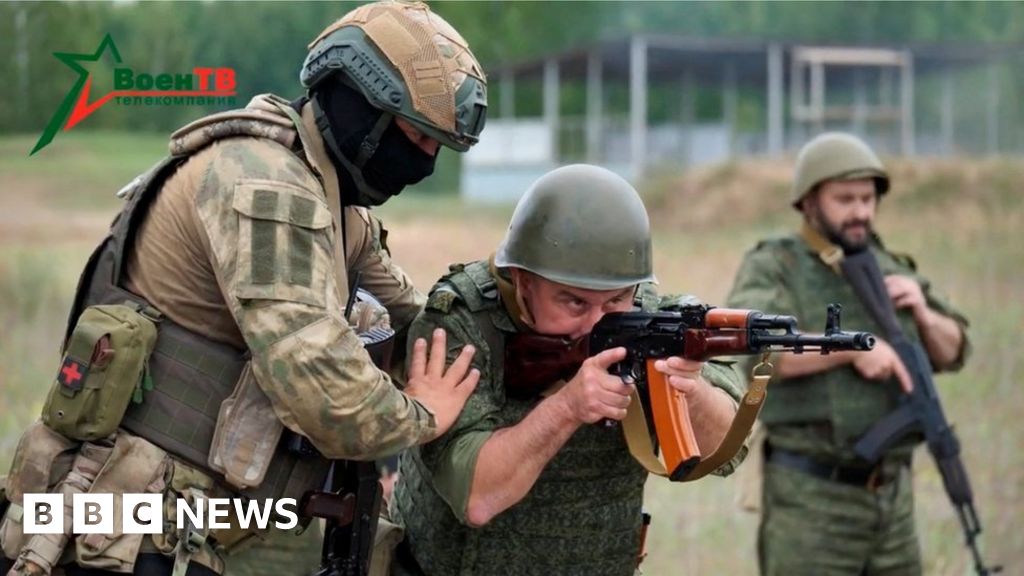- Written by Yaroslav Lukiev
- BBC News
image source, VoenTV/Belarusian Ministry of Defense via Reuters
Pictures have emerged purporting to show Wagner fighters training Belarusian soldiers at a base southeast of Minsk.
Ukraine’s Border Guard Service has confirmed that Wagner’s mercenaries have now arrived in Belarus from neighboring Russia.
The DPSU says it is assessing the number of “militants” in Belarus, which also shares a border with Ukraine, as well as their exact location and targets.
An unconfirmed report said a convoy of about 60 Wagner vehicles rolled across the border into Belarus early on Saturday.
In June, the Wagner Rebellion challenged the authority of President Vladimir Putin.
The Pact ended the 24-hour insurrection, which saw troops capture a city and march on Moscow – aborting it 200 kilometers (124 miles) from the capital.
Under the agreement, the Wagner fighters were told they could either join the regular Russian army or go to Belarus, a close ally of Russia. Wagner’s leader, Yevgeny Prigozhin, was also offered to move to Belarus, but his current whereabouts are unknown.
Wagner is a Russian private military company made up of mercenary fighters – many recruited from Russian prisons. They have fought some of the bloodiest battles since Russia launched its all-out invasion of Ukraine in February of last year.
DPSU spokesman Andriy Demchenko confirmed Wagner’s presence in Belarus in a short statement on Saturday.
He said Ukrainian border guards “continue to monitor the situation” across the country’s northern border. He gave no further details.
Earlier in the day, a Telegram channel linked to a prominent Belarusian opposition blogger reported that a large Wagner convoy had entered Belarus from Russia.
The Belarusian Hagon said the vehicles – including lorries, vans and buses – were escorted by Belarusian traffic police as they headed to the town of Osipovichi, about 85 kilometers (53 miles) southeast of the capital, Minsk.
The Belarusian authorities – which consider Belarusian Hagun an extremist channel – have not commented on this issue.
The Belarusian Defense Ministry said on Friday that Wagner troops are now serving as military trainers for the country’s regional defense forces. It added that the fighters were training Belarusian forces “in a number of military disciplines” near Osipovichi.
Earlier this week, President Putin revealed that Prigozhin had turned down an offer for his fighters to join the Russian army as a regular unit.
He told Russia’s Kommersant newspaper that several group leaders supported the plan, which will be spearheaded by a senior Wagner figure, during talks in Moscow on June 29.
But he said Prigozhin’s response was, “Guys [Wagner troops] Do not agree with this decision.
Putin also said that under Russian law, Wagner “does not exist”, because mercenary groups are not officially recognized. The president added that this “difficult issue” should be discussed in parliament.
The Kremlin appears to want to distinguish the Wagner boss from regular Wagner fighters, driving a wedge between them, says Steve Rosenberg, the BBC’s Russia editor in Moscow.
He adds that this would explain the Russian state media’s attempts to discredit Prigozhin.
Since the June 23 rebellion, there have been conflicting and unconfirmed reports of Prigozhin’s whereabouts.
He is a former Putin loyalist, once nicknamed “Putin’s chef” due to his food contracts with the Kremlin. But public infighting between Prigozhin and the Russian Ministry of Defense over the conduct of the war put him at sharp odds with the Russian government.
US President Joe Biden said Thursday that Prigozhin should be careful not to be poisoned after the insurrection.
Watch: The Day Wagner’s Boss Became a Crook… in 96 Seconds

“Unapologetic tv specialist. Hardcore zombie trailblazer. Infuriatingly humble problem solver.”








More Stories
Stand News editors convicted in sedition case
Latest Baysail sinking: Mike Lynch’s wife ‘didn’t want to leave boat without family’ as crew investigated
WFP halts Gaza operations after repeated shooting at aid vehicle